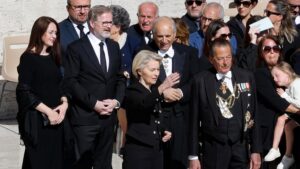“Not My King,” say the yellow T-shirts of the anti-monarchists TV cameras may swerve around in the coronation crowds. But he is our king, willy-nilly, like it or not, as he and his family are our dependants. The Guardian’s deep dive into the royal family’s finances shows our monarchy costs a fortune, more than anyone else’s in Europe.
The Borb?ns of Spain cost a mere ?7.4ma year, while we pay our Windsors a very pricey ?86m. And that’s before we add in the roughly ?40m a year in revenues from their Duchy estates – adding up to ?1.2bn over the years. That’s not much really, monarchists may claim. Out of ?1tn in annual government spending, the royals’ consumption of taxpayers money is a mere bagatelle, a fleabite.
If that’s what the royals think, you might wonder why they are so exceptionally secretive about anything touching on their wealth and incomes. Why are the wills of even obscure royals locked away from the public gaze? It may be because they think that most of their subjects would consider their incomes vast.
How big? Just ?1m of the king’s income would buy five AgeUK day centres, reopening ones shut by austerity. Or it could train 250 early years educators for nurseries, says the Early Years Alliance. Just one of his millions would pay for 25,000 GP appointments, says the King’s Fund. Or it would pay for a day’s childcare for 13,000 three- and four-year-olds, says the IFS. The king is paid more than the cost of all London’s street lighting. That ?1.2bn from the Duchies would pay for 30,000 nurses for a year. Money spent on the monarchy seems a lot or a little depending on whether you think one king is worth more than 4,000 teachers.
Protesters unfurled a banner on the spot in Westminster Abbey where the king will be crowned, reading: “Would you vote for him?” For fear that people might ask themselves that question, no split second was allowed between the last breath of the late Queen and proclaiming Charles King. She was not, after all, to be Elizabeth the last, so we face the prospect of three elderly men in a row being crowned in their 60s and 70s, stretching out to the century’s end. That’s not what the young predict, with YouGov finding that 40% of under-25s want the monarchy abolished. Though the crown stands on a solid 60% support, that’s quite a steep falling off from 75% a decade ago.
The trouble with the monarchy is not that it is too powerful but that it is utterly useless. So much is spent on ceremonial trappings to disguise its inner nothingness. We could have commissioned a neverending soap opera of The Crown, like The Truman Show, inventing its own plotlines in a plywood set at a fraction of the cost. All ermine and no knickers is what we’ve got, anyway.
It’s curious that many who were persuaded to vote for Brexit, at such a pernicious national cost, in order to reclaim “sovereignty” still seem willing as subjects to cede it without question to their sovereign. That royal prerogative is in turn handed to the prime minister in parliament as absolute power, barring a weak House of Lords.
Boris Johnson exposed the lack of any brake to stop him breaking basic law. He ordered the Queen to let him prorogue parliament illegally, and she, unelected, had no power to stop him. No one was there to prevent his voter suppression by demanding photo ID at elections to make the poor and young even less likely to vote. No one barred him from eviscerating the Electoral Commission’s power to prosecute illegal political donations. Elected presidents across Europe act as protectors of constitutions against such predations.
Just possibly, in unravelling the devilish conundrum of how to replace the House of Lords, which has defeated reformers since 1911, Labour may end up with a constitutional convention that finds itself exploring the nature of power. Last week the commission on political power (of which I am a member), chaired by Frances D’Souza and Frances Crook, suggested possible Lords reform that would not block the Commons but would have enough democratic legitimacy to carry authority. Any look at the balances of power could hardly avoid examining the bizarre vacuum caused by a redundant monarch.
Here comes the coronation in a few weeks, not much changed since I was waving at the last one, pleading in vain for a Dinky Toy gold coach. We have had a surfeit of royal folderol recently, with a jubilee, a funeral and a coronation all coming in less than 12 months. Guardian readers may not see the daily volumes of royal coverage in the rightwing press, splurging out reams of trivia and tripe, with pleasing pictures of the Princess of Wales. Stealing those scenes, has been the bad fairy, Prince Harry the Spare, delivering his truth.
My truth is that we are a country too bewitched by a phantasmagoria of majesty that encourages a national self-deceit about our power and importance in the world. All that ceremonial grandeur incites the state of mind that misled half the country to believe Britain could rule the waves again, all alone and bravely Brexiteering away from our continent.
Monarchy nurtures a conservativism of the heart, a feudal mindset, where patriotism becomes entangled with rightwing thinking. There is nothing unpatriotic about the left’s thinking, just different values that it cherishes about the country. The present perverse incarnation of the Conservative party is encapsulated in the Telegraph’s daily promotion of the monarchy, and the government’s trashing of institutions that summon most national pride – the BBC, the NHS, universities, the arts and sports from the grassroots up. Our best heritage has nothing to do with inheritance. Empty heads that wear the hollow crown are symbols of some of our worst tendencies – the growing weight of nepotism, inequality, privilege and inherited wealth.
Though 52% tell YouGov they are not interested in the coronation, expect the cameras to pick out the 15% “very interested” to represent the country’s mood. But, as everyone likes an extra holiday in this miserable country with the fewest in Europe, why not enjoy a spectacle that’s costing us all ?100m? Just possibly, though, this time the Guardian’s revelations about the high cost of our extravagant royals may grate a little more among so many struggling with unpayable bills.
Polly Toynbee is a Guardian columnist





